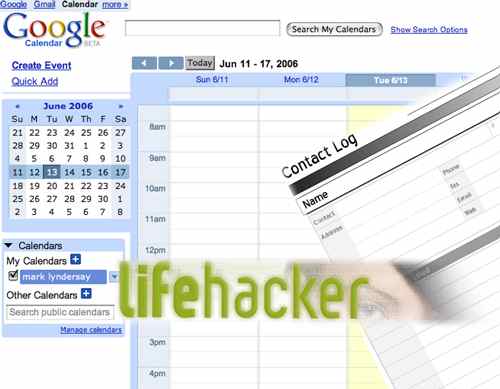BitDepth 529 - June 20
07/01/09 19:31 Filed in: BitDepth - June 2006
The Internet offers many web based and downloadable tools for getting your chaos organised...
A community tending chaos

Web resources for organisation; Google’s new calendar, a page from the DIY Planner and LifeHacker. Image by Mark Lyndersay.
The web creates unique communities, and there is nobody more in need of reassurance than someone in the midst of a struggle to bring order to their life.
Web resources dedicated to this mission range from the prosaic to the practical to the inspired.
Web based calendars have been around for some time. Hotmail and Yahoo users have long been able to set up personal pages that include calendars, but that space is heating up with the entry of Google into the web calendar market. Take a look at calendar sites like 30boxes.com and Plaxo’s HipCal.com if a web calendar seems like the right solution for you.
Web pages like myticklerfile.com and tadalist.com are online lists you can sign up for free of charge and access from any browser. Apart from that freedom of access, there’s little to recommend them over my base standard for a reference document, a piece of paper folded in my pocket.
To do lists are enshrined at www.todolistmagazine.com, which collects these haiku like journals of our day to day tasks and plans to publish them in a book.
There’s something truly surreal about cracking open a book full of other people’s doomed attempts to clear their agendas.
But that’s really the purity of the to do list, which can be a liberating tool if you embrace it. Far from the shackle it seems, a personal to do list is your own, private accounting of what’s important and how soon it needs to get done.
It’s an opportunity to retake control, if only for the few minutes it takes to write it, of the world, your job, your boss, and your life, redefine it according to your own preferences and vow, if only for the next 24 hours, to live according to your own sense of the import of things.
As you dig deeper into web resources available on personal organisation, you’ll find business focused organisation tracts like mindtools.com, which are really just Internet front-ends for publications that mercifully didn’t make to the crowded racks of business organisation books.
I really, truly despise these sites, which bait and switch you with a few tidbits up front and then invite you to buy a pdf, but they are increasingly common in the business advice market.
But business advice isn’t really what we’re looking for here. Restoring order to your personal chaos is an individual exercise, to be undertaken at your pace and to a degree that you are comfortable with.
It's the perfect subject for a blog and there are many which deal with the subject as part of wider ranging blogs or as the focus of the blog itself.
Sites like Ian’s messy desk and To Do or Else offer an introduction into the world of personal organisation blogs, but the king of personal organisation bloggers and a persuasive spokesman for the Getting Things Done (GTD) philosophy is Merlin Mann.
Mann’s site is named after one of the basic GTD systems; 12 folders for months, 31 folders for the days of the month which make up the paper organisation element of David Allen’s system.
Mann’s enthusiasm for GTD and his frank assessments of his successes and failures make for persuasive reading. He’s also a nut for any software that comes along that’s likely to make his day just an iota more organised.
For the lifestyle organiser, there’s Lifehacker.com, edited by Gina Trapani, which evolves personal organisation into an ethos for the 21st century geek. The site won one of Wired’s 2006 Rave Awards, but that isn’t the only reason to visit it regularly. As I write this, the “front page” lists references for everything from sorting out computer cable clutter to exfoliating with baking soda.
I love digital solutions for organising schedules and contacts, but somehow, everything always seems to come right back down to a piece of paper I can take with me.
That’s where Douglas Johnston’s DIY Planner project can change your life. On the site, diyplanner.com, are packages of PDF and editable Open Office templates of elegantly designed pages built to make sense of a working life.
Most of the downloadable packages run to 40 pages or more of designs you can print and put to use immediately.
A final word. The self-help and actualisation model often lives up to its acronym. Most people who buy self-help books have already bought self-help books and waste time looking for the grail of organisation solutions.
I found peace with a very personal mix of digital and paper solutions that matched my temperament and style.
Getting organised should be a process, not an end. There will come a day when each of us runs out of time and there will still be stuff remaining to be done. Let the process you choose make your life a little lighter and a lot more fun.
Web links...
<www.hipcal.com>
<www.30boxes.com>
<www.myticklerfile.com/>
<www.tadalist.com/>
<www.todolistmagazine.com>
<www.mindtools.com/>
<www.ismckenzie.com/organization-links/>
<www.diyplanner.com/>

Web resources for organisation; Google’s new calendar, a page from the DIY Planner and LifeHacker. Image by Mark Lyndersay.
The web creates unique communities, and there is nobody more in need of reassurance than someone in the midst of a struggle to bring order to their life.
Web resources dedicated to this mission range from the prosaic to the practical to the inspired.
Web based calendars have been around for some time. Hotmail and Yahoo users have long been able to set up personal pages that include calendars, but that space is heating up with the entry of Google into the web calendar market. Take a look at calendar sites like 30boxes.com and Plaxo’s HipCal.com if a web calendar seems like the right solution for you.
Web pages like myticklerfile.com and tadalist.com are online lists you can sign up for free of charge and access from any browser. Apart from that freedom of access, there’s little to recommend them over my base standard for a reference document, a piece of paper folded in my pocket.
To do lists are enshrined at www.todolistmagazine.com, which collects these haiku like journals of our day to day tasks and plans to publish them in a book.
There’s something truly surreal about cracking open a book full of other people’s doomed attempts to clear their agendas.
But that’s really the purity of the to do list, which can be a liberating tool if you embrace it. Far from the shackle it seems, a personal to do list is your own, private accounting of what’s important and how soon it needs to get done.
It’s an opportunity to retake control, if only for the few minutes it takes to write it, of the world, your job, your boss, and your life, redefine it according to your own preferences and vow, if only for the next 24 hours, to live according to your own sense of the import of things.
As you dig deeper into web resources available on personal organisation, you’ll find business focused organisation tracts like mindtools.com, which are really just Internet front-ends for publications that mercifully didn’t make to the crowded racks of business organisation books.
I really, truly despise these sites, which bait and switch you with a few tidbits up front and then invite you to buy a pdf, but they are increasingly common in the business advice market.
But business advice isn’t really what we’re looking for here. Restoring order to your personal chaos is an individual exercise, to be undertaken at your pace and to a degree that you are comfortable with.
It's the perfect subject for a blog and there are many which deal with the subject as part of wider ranging blogs or as the focus of the blog itself.
Sites like Ian’s messy desk and To Do or Else offer an introduction into the world of personal organisation blogs, but the king of personal organisation bloggers and a persuasive spokesman for the Getting Things Done (GTD) philosophy is Merlin Mann.
Mann’s site is named after one of the basic GTD systems; 12 folders for months, 31 folders for the days of the month which make up the paper organisation element of David Allen’s system.
Mann’s enthusiasm for GTD and his frank assessments of his successes and failures make for persuasive reading. He’s also a nut for any software that comes along that’s likely to make his day just an iota more organised.
For the lifestyle organiser, there’s Lifehacker.com, edited by Gina Trapani, which evolves personal organisation into an ethos for the 21st century geek. The site won one of Wired’s 2006 Rave Awards, but that isn’t the only reason to visit it regularly. As I write this, the “front page” lists references for everything from sorting out computer cable clutter to exfoliating with baking soda.
I love digital solutions for organising schedules and contacts, but somehow, everything always seems to come right back down to a piece of paper I can take with me.
That’s where Douglas Johnston’s DIY Planner project can change your life. On the site, diyplanner.com, are packages of PDF and editable Open Office templates of elegantly designed pages built to make sense of a working life.
Most of the downloadable packages run to 40 pages or more of designs you can print and put to use immediately.
A final word. The self-help and actualisation model often lives up to its acronym. Most people who buy self-help books have already bought self-help books and waste time looking for the grail of organisation solutions.
I found peace with a very personal mix of digital and paper solutions that matched my temperament and style.
Getting organised should be a process, not an end. There will come a day when each of us runs out of time and there will still be stuff remaining to be done. Let the process you choose make your life a little lighter and a lot more fun.
Web links...
<www.hipcal.com>
<www.30boxes.com>
<www.myticklerfile.com/>
<www.tadalist.com/>
<www.todolistmagazine.com>
<www.mindtools.com/>
<www.ismckenzie.com/organization-links/>
<www.diyplanner.com/>
blog comments powered by Disqus

